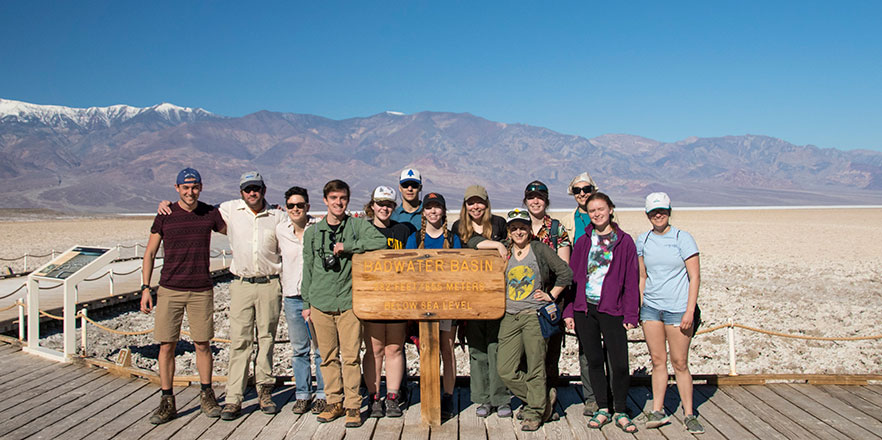Undergraduate Research is Key for Geology Faculty Lyman Persico
By Whitney Rich '20

In the driest desert in North America, Lyman Persico became a geologist.
He was an undergraduate researcher working alongside doctoral students and professors on a project through the University of Vermont. In a remote part of the Mojave Desert, they were measuring erosion rates of hillslopes.
That field research experience started Persico on his path to becoming a professor and geomorphologist, a person who studies the origin and evolution of topographic features.
"I am the product of being able to do undergrad research and I wouldn't be here today without that experience," he said
His undergraduate research experience was a catalyst for his career in geology and remains one of his biggest focuses as an assistant professor of geology and environmental studies at Whitman College. Persico is always looking for new ways to give students research opportunities.
Persico began research at Whitman as soon as he arrived four years ago. This spring a project he worked on with Associate Professor Kirsten Nicolaysen, who was the primary investigator, was published in the geologic journal Quaternary Research. The research, funded through the National Science Foundation and the Keck Geology Consortium, studied patterns of human settlement in the Aleutian Islands and how natural geologic processes influenced where and when people have been in certain places in these islands. The research group included paleoecologists, archeologists, geologists and undergraduate student researchers, three of who were from Whitman. Sam Sheffer '16, Henry Lanman '16 and Emily Deacon '16 all used the summer research experience for their senior theses. Working closely with these students reinforced how important undergraduate research is for Persico.
"Being able to be in the environment, to work with scientists in the field and to learn how science is done and how dynamic science is, gives them the understanding that science just isn't a body of knowledge buried in a library, that we are still generating that knowledge today," Persico said.
Persico's ongoing work includes more research in the Mojave Desert, studying how climate change causes soil erosion on hill slopes, and a new project he is beginning this summer in Yellowstone National Park. That project includes geology-biology major Trent Foky ‘20 and environmental studies-geology major Eliza Van Wetter ‘20. The students will work with Persico to study trophic cascades and how the removal of apex predators like wolves has changed stream behavior.
"I'm excited about being in the field and being in Yellowstone, a geologically active area with incredible wildlife. I'll be able to get both sides of my studies in biology and the geology," Foky said.
In spring 2019, Persico led the second round of Whitman students to visit the Mojave Desert. Persico developed the field trip four years ago to merge his two areas of study at Whitman in geology and environmental studies. The trip, which is conducted every other year during spring break, counts as a two-credit geology course and is open to any major and all classes. Persico takes the students to the same site where he did his undergraduate research, his 20 years in geologic research full circle. Persico tries to make the trip as interdisciplinary as possible, bringing in guest educators to teach ecology, alternative energy sources in the desert, and art.
Gustavo Bejar Lopez ‘20 transferred to Whitman from a geology program at a University in Ecuador and said the Mojave trip opened his eyes to a new way of learning geology and understanding science.
"I realized that I had been very narrowly focused on science and trying to understand phenomena and not on the interactions of nature and people. I realize now that it is a very important question," Bejar Lopez said. "I got these new perspectives of how science should be trying to understand how all these processes and how people interact with them, how they work and affect each other."
Bejar Lopez created a video chronicling the many places, people and experiences that made the trip memorable.
"I got to know the fact that the desert is not dead, it is a very fragile and lively ecosystem," said Bejar Lopez.
Persico hopes to continue to inspire students to pursue undergraduate research opportunities at Whitman and beyond.
"I want to get students involved in research as early as possible," he said. "I think an undergraduate research project is the time when you can really introduce people to those ideas and get them excited about science and research. It helps students to see a project through to completion."